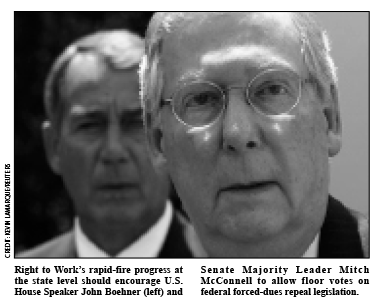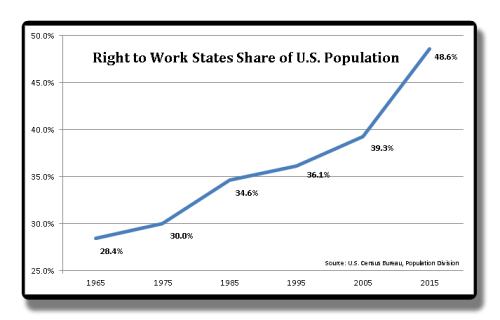Is This Any Way to Run a City’s Schools?
Leaked CTU Proposals Won’t Do Anything to Improve Schools’ Poor Performance
‘Collectivistic Style of Unionism . . . Is Way Out of Touch
(Click here to download the April 2015 National Right to Work Newsletter)
In late February and early March, respectively, Wisconsin state senators and representatives voted to enact a Right to Work law protecting private-sector employees from being fired for refusal to pay dues or fees to an unwanted union.
 Once Gov. Scott Walker signed the legislation on March 9, the Badger State became America’s 25th Right to Work state, and the third to make unionism voluntary since February 2012.
Once Gov. Scott Walker signed the legislation on March 9, the Badger State became America’s 25th Right to Work state, and the third to make unionism voluntary since February 2012.
Thanks to the statutes adopted over the course of barely more than three years by Wisconsin and two other states bordering Lake Michigan, Indiana and Michigan, the share of all Americans living in Right to Work states has risen from roughly 40% in 2010 to nearly 49% today.
And the rapid-fire progress at the state level is now giving a boost to freedom-loving citizens’ efforts to secure votes in the U.S. Congress on national Right to Work legislation.
Decades-Old Campaign Against Forced Unionism May Have Reached Tipping Point
Attorney, think-tank director and regular Forbes contributor George Leef commented on the significance of the series of Right to Work state-level victories in a recent column:
“The old, coercive and collectivistic style of unionism enshrined in the 1935 NLRA (National Labor Relations Act) is way out of touch with modern realities and its appeal is fading fast. . . . More states are apt to enact [Right to Work] statutes to avoid losing out on business investment . . . .”
Mark Mix, president of the National Right to Work Committee, later commented on Mr. Leef’s observations:
“Compulsory unionism has always been opposed by most Americans, but George Leef is quite right to observe that public support for the Right to Work has over time become even more lopsided and intense.
“And more and more federal politicians as well as state legislators and governors are getting the message regarding the importance and the strong appeal of the Right to Work issue.
“In recent years, elected officials and candidates in Indiana, Michigan, Wisconsin, and a host of other states have benefited greatly by highlighting their support for the Right to Work principle during their campaigns.
“Clearly, it’s time for Congress to consider the National Right to Work Act [H.R.612/S.391], which would repeal the federal labor law provisions authorizing forced union dues.”
H.R.612 and S.391 would abolish the 1935 National Labor Relations Act (NLRA) provisions and the 1951 Railway Labor Act (RLA) amendment that authorize the firing of employees for refusal to pay union dues or fees.
Bad Federal Policy Is the Reason Wisconsin Had to Pass a Right to Work Law
Because it denies employees who oppose irresponsible union bosses’ straitjacket work rules and hate-the-boss class warfare the freedom to fight back by cutting off their dues, current federal labor law ultimately slows productivity growth and makes America poorer.
“Right to Work supporters’ entirely appropriate jubilation over our third recent Great Lakes state victory shouldn’t cause us to forget that it’s Congress, not any state legislature, that spawned the evil of private-sector forced union dues in the first place,” said Mr. Mix.
“The only reason Wisconsinites had to battle against the Big Labor machine for years to enact a Right to Work law is that Congress imposed forced unionism on their state, just as it did on 49 other states.
“Moreover, even after all the current forced-dues contracts that were forged prior to the Wisconsin Right to Work law’s enactment expire, the Badger State still won’t be able to protect all of its private-sector employees from compulsory unionism.
“Because of federally-imposed loopholes, union bosses will still wield the power to get Wisconsin airline and railroad employees and employees on so-called ‘exclusive federal enclaves’ fired for refusal to pay dues or fees.”
Congress Has the Duty To Correct the Evils Federal Labor Policy Sustains
“Fortunately,” Mr. Mix added, “H.R.612 and S.391 would close these loopholes, which were drilled into every state Right to Work law by Congress and the federal courts.
“The Wisconsin victory shouldn’t blind us to the fact that Congress even today is perpetuating the problem of private-sector forced union dues.
“Ultimately, Congress must solve it for once and for all by passing the National Right to Work Act.”
Mr. Mix emphasized that Committee members and legislative staff are pressing for hearings and floor votes on both of the two pending federal Right to Work measures.
 H.R.612, the House Right to Work Bill, was introduced by Congressman Steve King (R-Iowa) and has a total of 94 sponsors as this Newsletter edition goes to press.
H.R.612, the House Right to Work Bill, was introduced by Congressman Steve King (R-Iowa) and has a total of 94 sponsors as this Newsletter edition goes to press.
S.391, the upper chamber’s Right to Work Bill, was introduced by Sen. Rand Paul (R-Ky.). In addition to Mr. Paul, 15 other senators have signed on to this measure.
“After roll-call Right to Work floor votes in the House and Senate, concerned citizens across the country will know for sure which of their federal elected officials support employee freedom of choice, and which are Big Labor stooges,” Mr. Mix explained.
“That alone will make a major difference.
“Poll after poll shows nearly 80% of Americans who regularly vote in federal elections support the Right to Work principle. Politicians who ignore what their constituents think and vote to perpetuate forced union dues may well suffer ballot-box repercussions down the road.”
After Voting in Favor of Forced Dues, Five Senators Were Defeated in 2014
To illustrate the point, Mr. Mix observed that, back in 2009, then-Sen. Jim DeMint (R-S.C.) had with the Committee’s assistance put his entire chamber on the record concerning an amendment that would have revoked Big Labor’s forced-dues and forced-fee privileges.
And just last year, five senators who had voted to kill the DeMint Amendment and thus forced hardworking Americans to continue bankrolling a union to get a job or keep their job were defeated at the polls as the Committee’s candidate survey program put a spotlight on their anti-Right to Work records.
“Today, Big Labor politicians Mark Begich [D-Alaska], Kay Hagan [D-N.C.], Mary Landrieu [D-La.], Mark Pryor [D-Ark.], and Mark Udall [D-Colo.] are no longer in the Senate, in part because they were unable to hide their support for union bosses’ special privileges,” noted Mr. Mix.
“And except for Mr. Begich, all of these senators were defeated by unabashedly pro-Right to Work challengers.
“But unless National Right to Work succeeds in getting recorded House and Senate votes on forced-dues repeal legislation in the current Congress, freedom-loving voters in key contested races in 2016 will not be as well-informed as Alaska, North Carolina, Louisiana, Arkansas and Colorado voters were last year.”
Mr. Mix called on Committee members across the country to join with him in lobbying House Speaker John Boehner (R-Ohio) and Senate Majority Leader Mitch McConnell (R-Ky.).
“Let them know you want them to do everything they can to ensure that Americans’ Right to Work without being forced to join or pay dues to a union is protected,” urged Mr. Mix.

Leaked CTU Proposals Won’t Do Anything to Improve Schools’ Poor Performance

Wherever Big Labor wields the power to collect forced union dues, union bosses funnel a large share of the confiscated money into efforts to elect and reelect business-bashing politicians. Employment growth tends to lag as a consequence.

Members Insist They Keep Pro-Right to Work Campaign Promises